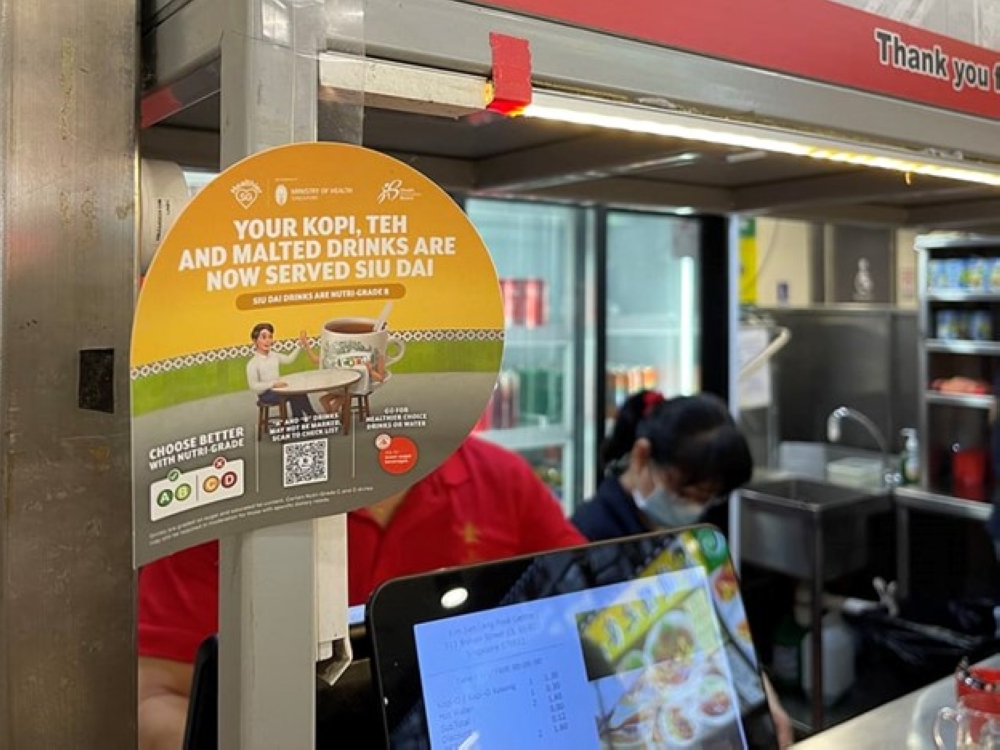SINGAPORE, March 4 — Drinks stall worker Hsu Hui Ling, 43, has been preparing beverages for 18 years. Aware of the amount of sugar that goes into every glass served, she has become more conscious of her own sugar intake.
“My husband was diagnosed with diabetes two years ago because it is hereditary. He has to be extra cautious when eating and drinking to control his sugar intake,” she said.
“His condition is still manageable, for now. But because of this experience, I will advise as many people as I can not to take too much sugar.”
Hsu, who works at a coffee shop in Ang Mo Kio, would often make it a point to ask customers if they would prefer their kopi or teh “siu dai”, which means less sweet in coffee shop lingo.
Advertisement
To her surprise, she is seeing more and more customers agreeing to the “siu dai” option when asked. In fact, a good mix of them would also order “kosong”, or no sugar.
Hsu believes that most people are becoming more health conscious today due to the constant messaging from the authorities.
One of these messages now includes the “Siu Dai by default” movement, launched by the Health Promotion Board (HPB) last September to complement the Nutri-Grade labelling requirement implemented on December 30.
Advertisement
The movement aims to encourage F&B operators to offer beverages with less sugar as a default.
On Friday, HPB announced that the Foochow Coffee Restaurant & Bar Merchants Association and Kheng Keow Coffee Merchants Restaurant and Bar-Owners Association have pledged their support to the movement.
The associations said in a dialogue last month that consumers are increasingly requesting “siu dai” or “kosong” drinks, and they hoped for more public education to ensure that consumers can ask for less sweet options.
Both associations have a combined total of over 500 members, representing over half of coffee shops in Singapore.
Most drink stall workers and customers TODAY spoke to lauded the movement and shared the same observation. Workers said they have noticed more customers asking for less sweetened drinks in the past one to two years.
However, a handful think that drinks with normal sweetness levels should be the default.

A drinks stall in a Bishan coffee shop showing a sign from the ‘Siu Dai by default’ movement, which says all kopi, teh, and malted drinks are served with less sugar. — TODAY pic
What drinks stall workers and customers say
Drinks stall worker Lee Yoon Thai, who works in a coffee shop in Bishan, said customers, both young and old, have been asking for less sweetened drinks.
“This is good because it saves us a lot of sugar,” said the 60-year-old, who started drinking coffee without sugar a year ago, as advised by her doctor, due to her high cholesterol.
Another worker at a drinks stall, Shen Lei, 40, said his boss had agreed to be part of the movement around half a year ago when it launched.
“Less sugar is always healthier. But even though we have a sign that says, ‘Your kopi, teh and malted drinks are now served siu dai’, we still ask the customer if they prefer the ‘siu dai’ option,” he said.
“They may not be aware of this movement, so we worry that if we serve ‘siu dai’ by default without confirming, the customer might be unhappy.”
Tech consultant Eugene Nah, 30, told TODAY that he started drinking his coffee with less sugar several years ago. Recognising that he was getting older, he decided to be more conscious of his sugar consumption.
“The taste is not that far off and it is supposedly healthier, so I think this movement to offer ‘siu dai’ by default is a step towards the right direction.”
Marketing manager Ken Ong, 33, agreed, saying that the initiative aligned with the Government’s ways of promoting a healthier lifestyle.
“I switched from normal sugar to kosong five years ago because I thought ‘siu dai’ didn’t taste any different from the normal option.
“Since I’m cutting down on sugar, I might as well go all the way,” he said.
Helper Masiroh, 26, also agrees that the movement would help Singapore residents like herself make healthier choices.
She said she was quite particular with her sugar intake, and would always ask for 50 per cent less sugar when ordering her teh.
“My aunt had diabetes, and she died 1.5 years ago. It was quite sad to see. Ever since then, my parents have also been very health conscious and asked me to cut down on sweet things,” said Masiroh, who has been working in Singapore for almost two years.
Some say drinks with normal sugar level should still be the norm
However, some customers have a different opinion. Insurance agent Dalton Lim, 27, said while he does not drink coffee every day, he likes his iced coffee the way it is when he orders it from a coffee shop.
“I would prefer it if things remained as they are. If customers prefer ‘siu dai’, they can mention it when they order instead.”
Retiree R Mallika, 61, said she would prefer her coffee to be at a normal sugar level as it enhances the taste.
“I understand (the movement) is good in the long run. But I’m already too used to how my coffee tastes with normal sugar level.”
Considering the different views, Lee, the drinks stall worker, said the movement may be difficult to implement nationwide as she knows some regular customers who cannot say no to sugar.
“Eight years ago, when I was working in another coffee shop in Orchard Road, one customer shocked me with his order. He ordered coffee with five spoonfuls of sugar,” she said.
“I don’t know where he is now, but I hope he’s okay.” — TODAY
